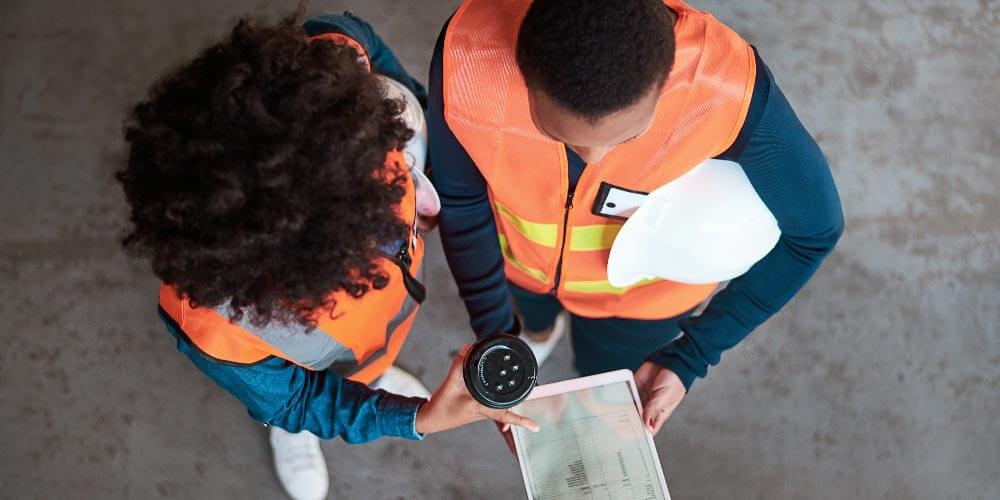Now more than ever, we’re seeing the critical importance of resilient, ethical, and sustainable supply chains.
The actions companies take within their supply chains will have profound implications for the climate, the food crisis, gender empowerment, global economic opportunity, and the overall success of the global Sustainable Development Agenda.
Supply chain sustainability and resilience are also matters of core business: Recent global supply chain disruptions caused by COVID-19 have demonstrated the vulnerability of our systems and the devastating ripple effects supply shocks can wreak on a company, communities, and the environment.
In today’s world, creating truly sustainable and reliable supply chains requires the actions and efforts of more than just one company. Recognizing the need for system-wide change, companies are turning to cross-sector partnerships to generate more effective solutions.
Here, we’ve compiled seven examples of promising cross-sector partnerships poised to build more resilient and sustainable supply chains.
7 Ways Cross-Sector Partnerships Build More Resilient and Sustainable Supply Chains
Below, we share seven cross-sector partnership examples across five major supply chain challenge areas:
- Supply chain traceability and transparency
- Fair labor/decent work
- Supply chain sustainability initiatives
- Responsible sourcing and procurement
- Sustainability assurance and verification
Challenge Area: Supply Chain Traceability and Transparency
For most companies, it is difficult to trace the entire supply chain from the first to the last mile. Most companies source ingredients and materials from thousands of suppliers, farmers, or producers and use distributors, agents, or cooperatives who may aggregate products or inputs from thousands of people. This makes transparency a serious challenge. How can companies verify sustainability if they can’t map their supply chain or know how their materials or products get handled each step of the way?
To help overcome this barrier, cross-sector partners are coming together to develop, pilot, and scale new technologies and approaches to increase supply chain transparency and traceability, from the first mile to the end buyer.
Example #1: Cross-Sector Partnerships for Seafood Traceability
To enhance seafood traceability from catch to plate, USAID; MDPI, an Indonesian foundation focused on sustainable fisheries; international seafood supplier Anova Seafood; and an Indonesian tuna processor partnered to develop and implement an internal traceability system for use by Indonesian tuna processors—a critical link in global seafood supply chains.
The partners created TraceTales to enable tuna processors to electronically capture, store, and manage seafood product data. Through the adoption of TraceTales, the local supplier digitizes their entire catch documentation process, tracking seafood products as they move through the value chain. Local suppliers can now meet U.S. Seafood Import Monitoring Program requirements, increase the pace and accuracy of their data capture and business calculations, and reduce product recalls and waste. TraceTales also supports verification of Fair Trade certification.
Challenge Area: Fair Labor / Decent Work
Modern slavery, labor rights violations, and the inability to secure decent work are rife across global supply chains. According to the United Nations, approximately 25 million people worldwide are victims of forced labor, and the International Labour Organization (ILO) estimates that there are 5.4 victims of modern slavery for every 1,000 people in the world.
These issues persist, in part, because they can be difficult to detect within sprawling global supply chains. They also span across borders, industries, and supply chains, making it extremely difficult for any one company, NGO, or government to act with systemic impact alone.
Example #2: Cross-Sector Partnerships to Reduce Labor Exploitation
Companies can still play a pivotal role in leading change on these issues. Under the USAID Asia Counter Trafficking in Persons (CTIP) project and the USAID Thailand CTIP project, we helped broker, develop, and implement a range of cross-sector partnerships to engage the private sector to combat human trafficking in global supply chains.
One notable example: USAID is partnering with Mars Petcare, a leading global pet care provider, to reduce labor exploitation in the seafood supply chain in Thailand and beyond. Partnership activities focus on improving worker voice on fishing vessels at sea, building industry capacity for responsible recruitment, and facilitating broader engagement among the private sector, government, and civil society stakeholders.
Example #3: Cross-Sector Partnerships to Reduce the Vulnerability of Cocoa Farmers
Tony’s Chocolonely, a Dutch chocolate company whose mission is to “make 100% slave free the norm in chocolate," created Tony’s Open Chain, an industry partnership that challenges other chocolate companies and retailers to commit to 5 Sourcing Principles designed to drive industry-level change, eliminate child and human slavery, and pay a livable income to cocoa farmers.

The 5 Sourcing Principles offer a vision for reducing the vulnerability of cocoa farmers across the industry by calling for:
- Traceable cocoa beans (so companies know the farmers and cooperatives they source from)
- Higher prices for cocoa (to ensure a livable income for farmers)
- Investments in farmers’ organizational capacity and professionalization (to increase their market access and bargaining power)
- 5-year buying commitments
- Support for farmers to undertake productivity, diversification, and quality programs to improve yield.
Tony’s Chocolonely couples these 5 Sourcing Principles with tools and resources to help chocolate industry players make the transition. ALDI Choco Changer, JOKOLADE, Albert Heijn’s Delicata, and Barry Callebaut have all joined or support the challenge.
Challenge Area: Supply Chain Sustainability Initiatives
From advancing sustainable and regenerative agricultural practices to reducing plastic pollution and mitigating carbon emissions across the chain: Complex and ambitious sustainability initiatives demand collaboration and action on the ground.
Sustainability teams recognize that it’s not enough to just set ambitious sustainability goals or develop strategies. They need on-the-ground adoption from farmers, producers, suppliers, and distributors to make progress. But many of these individuals also produce and sell to multiple outlets, each with their own goals, sustainability standards, and requirements.
In these cases, for individual companies to make significant progress on sustainability goals, they need to drive system-level change. A key piece of that equation: Pre-competitive collaboration, in which competitors and companies up and down the chain work together to advance a common goal.
Example #4: Pre-Competitive and Cross-Sector Collaboration to Advance Sustainable Agricultural Supply Chains
A company consortium from The Sustainable Agriculture Initiative (SAI) platform—including leading multinational agribusinesses such as PepsiCo and Ingredion—is currently forging pre-competitive and cross-sector partnerships that advance sustainable agricultural supply chains in Pakistan.
We’re currently working with the SAI platform to identify intersecting challenges across multiple company supply chains and to coordinate action and pre-competitive collaboration to address shared sustainability challenges. These companies are considering combining efforts and resources to engage farmers in Pakistan on sustainable agricultural solutions that will benefit each company and the collective system.
Example #5: Cross-Sector Partnership to Eliminate Greenhouse Gas Emissions
In 2017, Walmart launched Project Gigaton, in partnership with WWF and other civil society players, to mobilize and engage thousands of Walmart suppliers to eliminate greenhouse gas emissions linked to six pillars: Energy, waste, packaging, agriculture, forests, and product use and design.
The company seeks to eliminate one billion metric tons from its global supply chain—the largest in the world—by 2030. NGO partners are working with Walmart to design tools for the company’s global supplier network, to help suppliers effectively shift practices to reduce emissions.
Challenge Area: Responsible Sourcing and Procurement
For companies, there are many drivers that complicate responsible sourcing and procurement of raw materials and inputs: Sometimes, first-mile producers, such as farmers, extractors, and fisherfolk, lack the resources and training to access sustainable inputs, purchase quality equipment, or apply sustainable methods. Other times, it’s companies that need to make the commitment to (1) source responsibly and (2) potentially pay more.
Example #6: Industry-Wide Collaboration to Advance Responsible Sourcing of Minerals
One approach to level-up responsible sourcing? Industry-wide collaboration. For example, to help drive systemic change, companies are banding together to pool resources and streamline approaches under the Responsible Minerals Initiative (RMI).
The RMI brings together more than 400 companies in 10 different industries to create a range of tools, resources, and practical guidance to help companies advance responsible sourcing of minerals from conflict-affected and high-risk areas. The RMI also works with governments, NGOs, international organizations, and other key stakeholders in mineral supply chains, including via the European Partnership for Responsible Minerals and the Public-Private Alliance for Responsible Minerals Trade.
Challenge Area: Sustainability Assurance and Verification
Many companies have heavily invested in verification and certification models that identify and reward farmers, producers, and suppliers for using sustainable methods. But when it comes to traditional certification and auditing of individual small-scale producers, these tools often fall short despite significant investments.
Example #7: Partnerships to Accelerate Sustainable Aquaculture Sourcing
To overcome this challenge, cross-sector partners have joined forces to create the Partnership Assurance Model (PAM) to accelerate sustainable aquaculture improvement and sourcing.
Currently, Resonance is collaborating with Seafood Watch, Chicken of the Sea, Cheesecake Factory, Bon Appetit Management Company, other buyers, and suppliers to use this innovative approach to verify small-scale sustainable aquaculture production at the regional level rather than certifying individual aquaculture farms and operations.
Learn How to Fast-Track Sustainable Impact in Aquaculture
Deploying Cross-Sector Collaboration for Sustainable Supply Chains
Companies face daunting challenges when it comes to creating an equitable and sustainable supply chain—challenges that are often too big for them to tackle alone.
Whether a company aims to boost resiliency, sustainability, and productivity of its agricultural supply chain; take climate action; combat inequality, or address other labor and sustainability challenges, cross-sector partnerships offer enormous opportunities to make real, lasting progress. By co-investing and taking collective action, companies can realize greater business opportunities while simultaneously driving system-wide evolution.
Resonance works with companies to help them make informed decisions about when, how, and with whom to partner to achieve results. Get in touch with a partnership development expert to learn more about how we’ve helped companies build more resilient and sustainable supply chains through cross-sector partnerships.
Editor's Note: This post was originally published on November 17, 2021, and has been updated for accuracy and current best practices.



